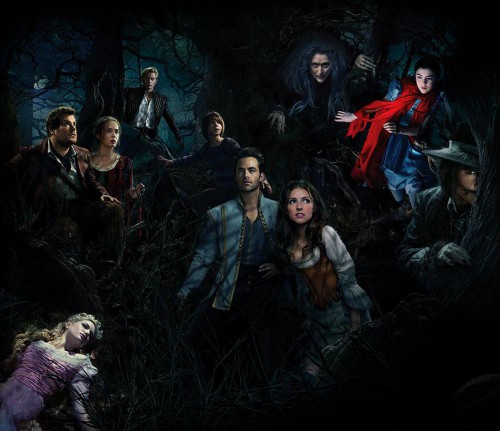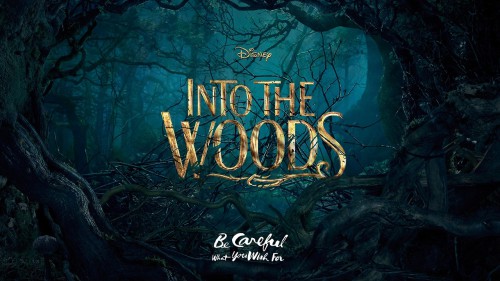
One less-than-magical night, not so long ago, while afflicted by a monstrous spell of boredom cast upon me by the solitary confinement of the common cold, I ventured, alone, Into the Woods. Why not? I had a gift card… Honestly, as much as I jest, I wanted to see the cluster-cuss of historic fairy tales on the big screen, even though it meant sitting through over 2 hours of sing-a-long Disney tunes (…alright, I liked those too). It was electrifying; an out-of-the-blue good time; like seeing the neo-Gothic steeples of Cinderella’s Orlando castle in person for the first time all over again. More outstanding was the not-so-Disney axiom ITW smacked its audience across the face with. As the film fades from theaters to local Redboxes, I’ve found that its sermon is still seeping within me.
ITW brings together the well-known Brother’s Grimm fairy tales of Cinderella, Little Red Riding Hood, Jack and the Beanstalk, and Rapunzel in a Crash-like manner while using the fresher story of a Baker and the his barren Wife as the charactorial adhesive (infertility, is obviously the perfect problem for a fairy tale solution). Though each infamous character represents different status quos, they are bound together by wishful thinking. Each one of them has a wish that is different from the next, but each wish represents a corporate dissatisfaction with the fist-to-face reality of life. They all wish more than anything, more than life, for something… better.
Cinderella wishes to attend the king’s festival, to escape the entrapment of her nasty aunt and brutal stepsisters. Poor Jack wishes his old, slackened cow, who is, adorably, his best friend, would produce some milk so that she may be spared from the slaughterhouse. Little Red Riding Hood wishes to bring her hungry Granny some bread, and maybe obtain some sweet pastries for herself in the process. The Baker and Wife want a child. Rapunzel wishes for freedom, and ultimately love, from her adopted mother, who is also our villain: the wicked Witch. This is the same Witch whose curse struck the Baker and Wife barren; the same Witch who will bring our cast together in The Woods.
 The Witch is ITW’s illustration, or perhaps better-labeled illusion, of divinity. Beginning with the Baker’s parents, she intricately intertwines the threads from each story, with the ultimate goal self-glorification. When the Baker was just a baby, his pregnant mother begged his father for, “Greens! Greens! Nothing but greens!” Her request tempted him to wander into the Witch’s garden, where he would commit the ultimate sin against the Witch. As she puts it, “He was robbing me! / Raping me! / Rooting through my rutabaga, / Raiding my arugula and/ Ripping up the rampion/ My champion! My favorite!” The Witch punishes the Baker’s parents by stealing their baby girl (Rapunzel), accepting her as her own in an unholy adoption of sorts, and curses the Baker’s bloodline for all of eternity! The scene is very Eden-esque, no? A man tempted by his woman to steal from forbidden plants, resulting in them and their offspring being cursed for eternity. I digress…
The Witch is ITW’s illustration, or perhaps better-labeled illusion, of divinity. Beginning with the Baker’s parents, she intricately intertwines the threads from each story, with the ultimate goal self-glorification. When the Baker was just a baby, his pregnant mother begged his father for, “Greens! Greens! Nothing but greens!” Her request tempted him to wander into the Witch’s garden, where he would commit the ultimate sin against the Witch. As she puts it, “He was robbing me! / Raping me! / Rooting through my rutabaga, / Raiding my arugula and/ Ripping up the rampion/ My champion! My favorite!” The Witch punishes the Baker’s parents by stealing their baby girl (Rapunzel), accepting her as her own in an unholy adoption of sorts, and curses the Baker’s bloodline for all of eternity! The scene is very Eden-esque, no? A man tempted by his woman to steal from forbidden plants, resulting in them and their offspring being cursed for eternity. I digress…
In a ploy to regain personal beauty, the witch tells the baker that, if he can scrounge up items from each character, Jack, Red, Rapunzel, and Cinderella, she will, “Reverse the Curse!” Salvation is offered! The captives can be freed! …if they work hard enough. Again, all six protagonists are bound together by a wishful ethos, and their wishes parallel a helpless state of prayer: worshipfully sung out (it’s a musical, so, ya…), agonized eyes to the sky in hopes that someone somewhere will hear them.
It doesn’t take a rocket scientist to see that a prayer and a wish share many similarities. Whether or not the hearer is divine by nature is sort of beside the point. Jack, Red, the Baker and Wife, Rapunzel, Cinderella, and even the Witch are all under the impression, or spell, that if their wishes are granted, they will be infinitely better off because of it. If not, a part of them will remain empty, unfulfilled. The Witch, with her illusion of divinity, enforces this by giving the Baker and Wife a checklist that promises answers for each other character’s wishes–but will rob them as well.
(Spoilers ahead)
Jack does sell his cow to the Baker to see that she is not slaughtered. In return, he receives magic beans. We all know what happens next. A prince stumbles upon Rapunzel, and offers her love and freedom. Red makes it to Granny’s house in one piece, even after being swallowed up by and then rescued from the Big Bad Wolf. Cinderella gets to marry a prince too, no longer a slave to her evil aunt and stepsisters. After incredible toil, the Baker and Wife do, though rather sneakily, obtain all necessary items to re-beautify the Witch, and re-fertilize the Wife’s womb. They have a son. And the Witch is made beautiful once again.
Perhaps this is where ITW should’ve stop, being a fairy tale and all: happy ending prevailed, wishes were granted. Though I had prepared myself for such a conclusion, it still did not feel right. The happy ending appeared as a facade, a corny affectation meant only to hide the truthful, dirty diction to come. No, the story was not finished.

Enter one of Jack’s super malevolent, destructive giants. Right on the heels of Cinderella’s wedding, it destroys everything, pushing our protagonists, you guessed it, right back into The Woods. In the scenes that follow, calamity takes the reigns.
The giant murders Red’s whole family along with Jack’s best friend (Milky White the cow) and mother. The two children of our story are now orphans. Cinderella’s Prince finds the Baker’s Wife alone in The Woods while searching for the Giant, and of course, they make out. Wouldn’t you do the same? As all cinephiles know, infidelity in film is commonly followed by untimely death… so the Wife falls off a cliff. Now the Baker is a single parent, scared excrement-less of raising a motherless child. And if there was ever a bad place to cheat on Cinderella, it’s the woods. She can talk to birds for God’s-sake. Cinderella’s marriage is instantly annulled. Every character has fought so hard to obtain their wish, and in a span of minutes, everything’s ruined. At this somber juncture, all of our characters gather together in The Woods, and break out in one last sad, but hope-filled song.
Someone is on your side
Our side–
Someone else is not
While we’re seeing our side
Maybe we forgot: they are not alone.
No one is alone.I wish…
I know…
They are not alone. The people they despise are not alone. No one is alone. They wish it were better, and they empathize with each other’s desire. These lyrics drip with self-awareness and love. At their darkest moment, in the midst of all of their suffering (still in The Woods) they see they are not alone. In their darkest hour, they understand closing statement to Francis Spufford’s Unapologetic,
“Don’t be surprised by any human cruelty. But don’t be afraid. Far more can be mended than you know.”
My prayer for myself, indeed my prayer for all of us, is that, like Jack, Red, Cinderella, Rapunzel, Baker and Wife, our wishes in The Woods might crumble and our collective exhaustion yield to something new yet equally hopeful: the Grace that says, “You may know Him, because He chose to know you. You are not alone. You are infinitely loved, despite being without merit.”

COMMENTS
Leave a Reply













